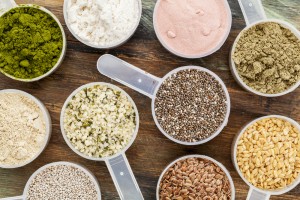There are healthy foods referred to as incomplete protein, including legumes, whole nuts, peas, grains and seeds and corn. Combine two or more incomplete healthy protein foods and you get amazing protein nutrition – you’ve now got a vegan complete protein.
Protein is an essential part of your diet. Protein is required for tissue repair and growth and is an important part of every organ and cell. According to the Vegetarian Resource Group, it isn’t difficult for vegans to get enough protein in their diets. Foods provide either complete or incomplete protein, depending on whether or not they contain all of the necessary building blocks of proteins, or amino acids. There are vegan sources of complete protein.
 In order to get a “complete” protein, in an effort to make sure vegetarians were getting enough of all the amino acids, in the early 1970s in her book Diet for a Small Planet, Frances Moore Lappe popularized the idea of combining plant proteins at each meal. You can make sure that you are getting both methionine and lysine at each meal, by mixing grains and beans.
In order to get a “complete” protein, in an effort to make sure vegetarians were getting enough of all the amino acids, in the early 1970s in her book Diet for a Small Planet, Frances Moore Lappe popularized the idea of combining plant proteins at each meal. You can make sure that you are getting both methionine and lysine at each meal, by mixing grains and beans.
Quinoa provides all the amino acids necessary to be a complete protein. Quinoa is grain-like and described as having a crunchy, creamy and fluffy texture and a nutty flavor. It has 9 grams of protein per cup. It is also a good source of the minerals iron, manganese, copper, magnesium and phosphorous. Quinoa typically cooks in 15 minutes, and it can be dry-roasted before cooking to increase its nutty flavor.
Hemp seeds are one of the most nutritionally complete protein foods in the world. Buy some hemp protein powder and eat it in your cereal or smoothies every day if you are worried about getting all your essential complete vegan protein and amino acids. If you buy it in a health food store, Hemp is fairly expensive.
Soy is a complete protein for vegans. It’s found in many foods and prepared many different ways, including soy sauce, tempeh, miso and tofu soy milk and soy flour, and in vegetarian foods such as veggie burgers and meatless hot dogs. According to Aaron J, Soy may have other benefits beyond providing high-quality protein. Michelfelder, M.D., in the January 1, 2009 issue of the journal American Family Physician. Soy may improve cholesterol levels, help maintain strong bones, and prevent fractures and diminish hot flashes in menopausal women, Michelfelder says.